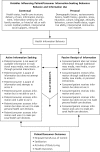Health information seeking, receipt, and use in diabetes self-management
- PMID: 20644188
- PMCID: PMC2906528
- DOI: 10.1370/afm.1115
Health information seeking, receipt, and use in diabetes self-management
Abstract
Purpose: Diabetes self-management is essential for diabetes control, yet little is known about patient preferences for sources of health information or about the extent to which information is sought directly or received passively through various media sources. The aim of this qualitative study was to identify how individuals with diabetes seek and use health care information.
Methods: Using a health information model to guide our research, we conducted 9 focus groups with 46 adults with a diagnosis of diabetes and then analyzed the transcripts and notes from these focus groups.
Results: Five themes emerged: (1) passive receipt of health information about diabetes is an important aspect of health information behavior; (2) patients weave their own information web depending on their disease trajectory; (3) patients' personal relationships help them understand and use this information; (4) a relationship with a health care professional is needed to cope with complicated and sometimes conflicting information; and (5) health literacy makes a difference in patients' ability to understand and use information.
Conclusions: Patients make decisions about diabetes self-management depending on their current needs, seeking and incorporating diverse information sources not traditionally viewed as providing health information. Based on our findings, we have developed a new health information model that reflects both the nonlinear nature of health information-seeking behavior and the interplay of both active information seeking and passive receipt of information.
Figures
References
-
- Partnership to Fight Chronic Disease. United States Workplace Wellness Alliance. Almanac of Chronic Disease, 2009 Edition: The Impact of Chronic Disease on U.S. Health and Prosperity: A Collection of Statistics and Commentary. Washington, DC: Partnership to Fight Chronic Disease: US Workplace Wellness Alliance; 2009.
-
- Giffin K. The contribution of studies of source credibility to a theory of interpersonal trust in the communication process. Psychol Bull. 1967;68(2):104–120. - PubMed
-
- Hovland CI, Weiss W. The influence of source credibility on communication effectiveness. Public Opin Q. 1951;15:635–650.
-
- Graham EE, Barbato CA, Perse EM. The interpersonal communication motives model. Commun Q. 1993;41(2):172–186.
Publication types
MeSH terms
LinkOut - more resources
Full Text Sources
Medical

